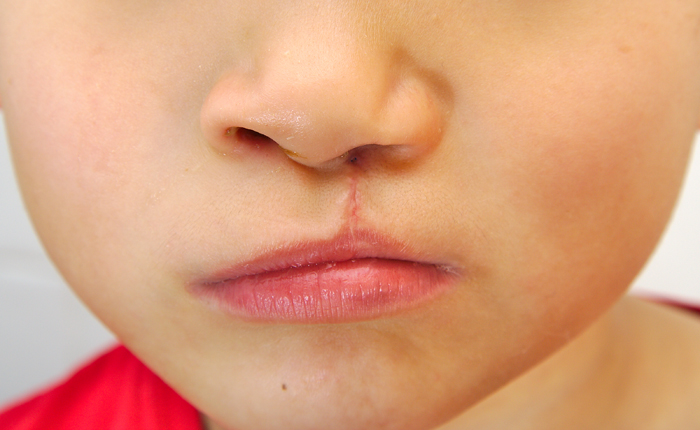Cleft Palate Surgery in Karol Bagh, Delhi
A cleft palate or cleft lip surgery is an effective surgical technique for treating birth flaws in children. Your child may develop a cleft palate when the sides of the roof of the mouth do not fuse properly, leaving a gap or an opening in between.
A cleft lip develops when there is a split in the upper lip of your child. Both these conditions need cleft repair surgery to close the gap.
What is a cleft repair procedure?
Cleft repair surgery can restore the normal appearance and function of the affected body part.
Doctors recommend early correction of cleft palate and cleft lip, typically between 8 and 12 months. It prevents your child from the resulting health problems.
These problems occur between the 8th and 12th weeks of gestation. A cleft lip repair specialist near you can identify any abnormalities in a child’s facial structures with the help of prenatal ultrasound.

Who qualifies for cleft repair surgery?
Children with cleft lips or cleft palates who suffer from the following health issues need cleft repair:
- Difficulty while eating or drinking
- Hearing troubles
- Speech problems
- Chronic ear infections
- A nasal effect while talking
Visit a plastic surgeon near you to discuss the surgery in detail.
What are the causes that lead to cleft repair?
A cleft palate or a cleft lip can be the result of:
- Exposure to substances like alcohol, smoking and certain medicines
- Weight gain during pregnancy
- Evidence showing gestational diabetes can also increase the risk
- Parents who have a family history of this issue
- Vitamin deficiencies
- Environmental factors
- If the mother suffers a severe illness during pregnancy
Why is this procedure conducted?
It can be an extremely challenging task to breastfeed your baby with a cleft palate. Since there is a hole in the roof of the mouth, there is no suction. As your child grows, eating and drinking become difficult.
Another crucial reason for the surgery is your child’s speech. Unhindered speech requires regulation of airflow through our nose and mouth. If a lot of air leaks out of the nose, our speech can become almost incomprehensible.
So, a child with a cleft palate cannot control the air rushing out from the nose, making it tricky for the child to speak fluently.
Request an appointment at Apollo Spectra Hospitals, Karol Bagh, New Delhi.
Call 1860 500 2244 to book an appointment.
How is the procedure done?
A cleft palate repair and a cleft repair surgery involve the following steps:
Cleft palate repair (palatoplasty)
- Surgeons perform this procedure under general anesthesia.
- Using specialized instruments, the surgeon makes incisions on both sides of the cleft.
- Then the surgeon works on reconstructing the palate by repositioning the tissues and muscles.
- Lastly, the surgeon closes the incisions with sutures.
Cleft lip repair (cheiloplasty)
- By making incisions on both sides of the defect, the surgeon builds flaps of tissues and stitches the flaps along with the lip muscles.
- It gives the lips a normal appearance and function.
- The surgeon may place ear tubes in the eardrum to lower the risk of ear fluid build-up as it can cause hearing loss.
Later, the surgeon may suggest additional surgeries to improve your child’s facial appearance.
How can your child benefit from cleft repair surgery?
- Can enhance the facial symmetry of your child.
- Your child can eat, drink, hear and talk comfortably.
- It protects your child from other associated complications like ear infections, hindrance in growth and more.
- Provides your child with confidence to handle emotional and social challenges.
Are there any post-surgery complications?
If you notice any of the following signs in your child, contact a cleft palate repair specialist near you immediately:
- Fever that is higher than 101.4 F (38.56 C).
- Bleeding or smelly discharge from the surgical wound
- Breathing difficulty
- Change in skin color (grey, blue or if your child looks pale)
- Redness, irritation or swelling
- Less urination than usual
- Symptoms of dehydration, including dry mouth, low energy, sunken eyes
- Wounds taking a longer time to heal
- Widening of scars
Conclusion
It can be emotionally demanding for parents to have a child with a cleft palate, but the good news is that it is curable. Doctors highly endorse cleft repair surgery so that every child with this problem can lead a happy and healthy life.
Visit a plastic surgery hospital near you to seek timely treatment.
References
https://www.mayoclinic.org/diseases-conditions/cleft-palate/diagnosis-treatment/drc-20370990
https://my.clevelandclinic.org/health/diseases/10947-cleft-lip-and-palate
A fistula is a rare complication in which an opening may appear after a cleft repair surgery. It occurs due to poor recovery of the surgical wound. If the fistula is large, doctors recommend early surgery. But they wait till your child recovers completely from cleft repair surgery.
At home, your child can eat noodles, vegetable purees and anything soft or mashed. Avoid using a straw. Ensure that no food granules get stuck in the gap between the teeth and the palate.
The following can reduce the risks:
- Avoid smoking or intake of alcohol during pregnancy.
- Take prenatal vitamins.
- Talk to a genetic counsellor.
Symptoms
Our Top Specialities
NOTICE BOARD
CONTACT US
CONTACT US
 Book Appointment
Book Appointment


.svg)
.svg)
.svg)
.svg)








